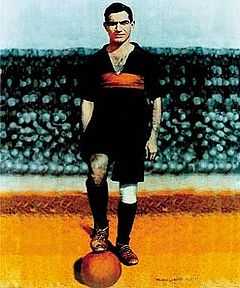Pedro Arico Suárez
 | |||
| Personal information | |||
|---|---|---|---|
| Full name | Pedro Bonifacio Suárez Pérez | ||
| Date of birth | June 5, 1908 | ||
| Place of birth | Santa Brígida, Gran Canaria, Spain | ||
| Date of death | April 18, 1979 (aged 70) | ||
| Place of death | Buenos Aires, Argentina | ||
| Height | 1.67 m (5 ft 5 1⁄2 in) | ||
| Playing position | Left-half | ||
| Senior career* | |||
| Years | Team | Apps† | (Gls)† |
| 1926-1930 | Ferro Carril Oeste | ||
| 1930-1942 | Boca Juniors | 311 | (1) |
| National team | |||
| 1930-1940 | Argentina | 12 | (1) |
| * Senior club appearances and goals counted for the domestic league only. † Appearances (Goals). | |||
Pedro Bonifacio Suárez Pérez, commonly known as Arico Suárez (Gran Canaria, Spain, 5 June 1908 - Buenos Aires, Argentina, 18 April 1979), was a Spanish-Argentine football left half who played for Boca Juniors where he won five league championships and for the Argentina national team, including appearances at the inaugural FIFA World Cup in 1930, making him the first Canary Islander to play in the World Cup [1] until David Jiménez Silva and Pedro Rodríguez Ledesma, who played and won the World Cup in 2010.
Playing career
Club
Suárez was born in Santa Brígida (Gran Canaria) but emigrated to Argentina with his parents at a young age. He began his playing career in 1926 with Ferro Carril Oeste where he played until his transfer to Boca Juniors in 1930.
In his first season with Boca, Suárez was part of the team that won the 1930 league championship. Over the following decade he won afurther four league championships in 1931, 1934, 1935 and 1940. He also won the Copa Ibarguren in 1940. Arico made a total of 335 appearances in all competitions, scoring one goal which came in a 2-2 draw with Platense on 6 August 1933.
International
Suárez made his international debut for Argentina during the 1930 FIFA World Cup, he would go on to make a total of 12 appearances for the Argentina national team between 1930 and 1940.
Titles
- Primera División Argentina (5): 1930, 1931, 1934, 1935 and 1940
- Copa Ibarguren (1): 1940
References
- ↑ Los 100 años de Arico Suárez at La Provincia (Spanish)
External links
- (Spanish) Biography at Informe Xeneize
- (Spanish) Pedro "Arico" Suárez at Historia del futbol Canario
- (Spanish) Statistics at Historia de Boca